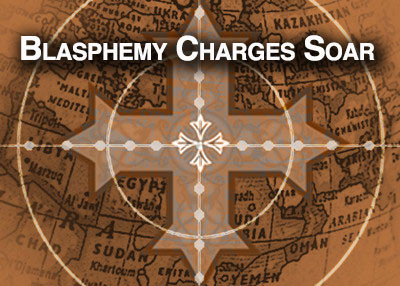 Post "Arab Spring" Egypt continues exposing its true nature, including now legal persecution of Christians. Earlier this month, according to Fox News, Dimyana Abdel-Nour a "pale, young Christian woman sat handcuffed in the courtroom, accused of insulting Islam while teaching history of religions to fourth-graders." Her accusers are 10-year-old Muslim children who say she "showed disgust when she spoke of Islam in class."
Post "Arab Spring" Egypt continues exposing its true nature, including now legal persecution of Christians. Earlier this month, according to Fox News, Dimyana Abdel-Nour a "pale, young Christian woman sat handcuffed in the courtroom, accused of insulting Islam while teaching history of religions to fourth-graders." Her accusers are 10-year-old Muslim children who say she "showed disgust when she spoke of Islam in class."
According to Islamic law, the word of inferior Christians cannot stand against that of superior Muslims—even if they are resentful or confused children.
Released on bail, Dimyana is unable to talk and "suffering a nervous breakdown."
The report continues:
Criminalizing blasphemy was enshrined in the country's Islamist-backed constitution that was adopted in December. Writers, activists and even a famous television comedian have been accused of blasphemy since then. But Christians seem to be the favorite target of Islamist prosecutors. Their fragile cases — the main basis of the case against Abdel-Nour's case the testimony of children — are greeted with sympathy from courtroom judges with their own religious bias or who fear the wrath of Islamists, according to activists. The result is a growing number of Egyptians, including many Christians, who have been convicted and sent to prison for blasphemy…. Part of the Salafis' antagonism toward Christians is rooted in the belief that they were a protected group under Mubarak's regime while they, the Salafis, were persecuted. Now empowered, they may be out to exact revenge on the Christians....
Indeed, before President Obama threw Hosni Mubarak under the bus in the name of "freedom" and "democracy," Christians were at least legally protected: Muslim mobs were limited to lawless attacks on Christian churches and persons. But now that the Muslim Brotherhood and Salafis are in charge, Egypt's Christians are now also experiencing legal persecution in the courtrooms, especially in the context of blasphemy.
The following cases of blasphemy laws targeting Christians, some of which were never reported in the West, represent a mere sampling of post "Arab Spring" Egypt. For many more such cases, including all around the Muslim world, see my new book Crucified Again: Exposing Islam's New War on Christians (April, 2013, published by Regnery in cooperation with Gatestone Institute.
In November 2012, an Egyptian court decreed that eight Christians living in America—seven native Egyptians, and one American, Pastor Terry Jones—be sent to Egypt and executed in connection with the 16-minute YouTube Muhammad video. The prosecution offered no real evidence against the Christians, most of whom deny any involvement, and instead relied on inciting Muslims against the accused by replaying the video in the courtroom.
Last September, 27-year-old Copt Albert Saber was accused of posting clips of the Muhammad movie—which he had actually downloaded from a Muslim site, not YouTube. Muslims attacked and evicted him and his mother from their home; he was arrested and is currently awaiting a multi-year sentence.
In March 2012, Makram Diab, a 49-year-old Christian, was sentenced in a 10-minute show trial to six years in prison for "insulting Muhammad." He had gotten into a religious argument with a Muslim colleague, who went on to protest that Diab had offended the prophet. The judge doubled the sentence to appease an angry mob, 2,500 strong, which had surrounded the courtroom demanding Diab's death.
In August 2012, Bishoy Kamil, a Copt in his 20s who worked as a teacher, was arrested and given six years in prison for posting cartoons deemed insulting to Islam and its prophet on Facebook. Like Diab, he was given more than double the maximum penalty to appease mob calls for his death.
In April 2012, Gamal Abdu Massud, a teenage Christian student, was sentenced to three years on accusations that he had posted a Muhammad cartoon on his Facebook account, which had only some 135 friends. Apparently the wrong "friend" saw it, for it was not long before local Muslims rioted, burning the Coptic teenager's house as well as the homes of five other Christians.
In June 2011, another Christian woman, Naima Wahib Habil, newly hired as director of a junior high school for girls, was sentenced to two years imprisonment on the accusation that she had torn a copy of the Koran in front of her students. The rumor inspired mob riots and calls for her death.
Human rights activist Magdi Khalil of Coptic Solidarity told me that in all these cases "Islamist prosecutors rely exclusively on circumstantial evidence. And the judges do not behave like impartial judges, but rather as demagogues haranguing an already frenzied mob, and then sacrificing the Copts to satisfy them. Nor do they allow any representation for the accused. Judges just show up and pass their verdicts in very brief mock trials."
Such is the new Egypt that Obama helped create—despite all the glaring warning signs that it would develop just like this. Christian persecution in Egypt has gone from being a common, though technically illegal, phenomenon, to being widespread, and now legal.
Raymond Ibrahim is author of Crucified Again: Exposing Islam's New War on Christians. A Middle East and Islam expert, he is a Shillman Fellow at the David Horowitz Freedom Center and associate fellow at the Middle East Forum.


